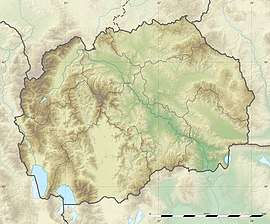Fight on Čelopek
The Fight on Čelopek (Serbian: Borba na Čelopeku/Борба на Челопеку) or Battle on Čelopek (Bitka/Битка) was fought at the Čelopek plateau near Kozjak between the Serbian Chetnik Organization, a Serbian rebel faction, and Ottoman officers accompanied by Ottoman Albanian bashi-bozuks, on April 16, 1905.
| Fight on Čelopek | |||||||
|---|---|---|---|---|---|---|---|
| Part of Serbian Chetnik Organization | |||||||
| |||||||
| Belligerents | |||||||
|
|
| ||||||
| Commanders and leaders | |||||||
|
Borko Paštrović Aksentije Bacetović Ilija Jovanović-Pčinjski Lazar Kujundžić Pavle Mladenović Ljubomir Jezdić | N/A | ||||||
| Strength | |||||||
| 120–130 | 200 | ||||||
| Casualties and losses | |||||||
| 4 dead | 200 dead | ||||||
 Location of Čelopek in the Republic of Macedonia | |||||||
Background
After the fights in Tabanovce, Savatije Milošević, Lazar Kujundžić and Aksentije Bacetović-Baceta left their offices as organizators of the action, wanting to feel the Chetnik lifestyle "from within" as voivodes. Baceta was to replace the then Chief of Upper Staff, Ilija Jovanović. Baceta and Savatije Milošević, by mid-April, had moved 107 fighters across the border.[1]
Fight
At dawn on Holy Saturday (15 April [O.S. 2 April]), the two large bands (Cheta) -- Belgrade and Kragujevac -- arrived at the village of Dubočica. There, they were awaited by the bands of Ilija Jovanović, Lazar Kujundžić, Čiča-Pavle Mladenović and Ljubomir Jezdić. The Kragujevac Band was led by captain (kapetan) Borko Paštrović and had the sub-lieutenants (potporučnici): Vojin Popović-Vuk, Dušan Jezdić, Petar Todorović and Dušan Putniković. The Belgrade Band was led by Baceta, and included Savatije Mihailović, officers (oficiri) Janićije Mićić, Bogdan Jugović Hajnc, Vojislav Tankosić, Branivoj Jovanović and non-commissioned officers (podoficiri) Jović, Radul Kosovac, Novica Leovac, Radoš Vasiljević, Trajko and Radivoje Ilić. They were also accompanied with the bands of Stevan Nedić and Doksim Mihailović, which had been returned to western Povardarje after vacationing in Belgrade.[1]
On 16 April [O.S. 3 April], at the heights of Čelopek, around 120 chetniks under the command of voivodes Doksim, Čiča-Pavle, Baceta, Kujundžić, Paštrović, Skopljanče, Tankosić and Dovezenski fought a uniformed Ottoman army accompanied by Albanians from the surrounding villages. During the battle Čiča-Pavle took the Čelopek heights and thus prevented the encirclement of the bands from the Albanian bashi-bozuks; overtaking the three peaks gave the chetniks a strategical advantage and after the victorious fight they made heavy losses to the Turks and Albanians (over 200 dead and wounded), while only having two dead (Petar Todorović and Radul Kosovac) according to Serbian sources,[2][3] while British Vice-Consul Wilfred Gilbert Thesiger claimed in a letter dated 19 April [O.S. 6 April] that fighting near Kumanovo 'the earlier day' had taken 4 Serbian officers' lives, and 8 captured.[4]
Aftermath
The victory enraged the Ottomans,[5] who began manhunting the rebels. The rebels were forced to retreat across the border,[6] and were dispersed. Čiča-Pavle and Bacetović were surrounded by the Ottoman army near the village of Beljakovce (today's Kriva Palanka) on 16 June, and everyone in their bands were killed.[7][8]
On 21 January 1906, another fight took place in the same place, in which Vasilije Trbić nearly lost his whole band (22 men) to the Ottomans.
References
- Ilić, Vladimir (March 5, 2003). "Ubistvo popa Taška". Glas Javnosti.
- Ilić 2006, p. 55; Ilić, Vladimir (March 6, 2003). "Borba na Čelopeku". Glas Javnosti.
- Krakov 1930, pp. 216–222
- Rastović 2011, p. 137.
- Драгиша Васић; Гојко Тешић; Александар Јерков; Вук Крњевић (1990). Dva meseca u jugoslovenskom Sibiru: Utisci iz Rusije ; Putopisi, eseji, kritike, članci. Просвета.
То је било после победе на Челопеку због коje Турци беху побеснели.
- Alekan Jovanović (1937). Spomenica dvadesetpetogodishnjice oslobodjenja Južne Srbije.
Потерна одељења турске војске открила су их у Никуљану. После одржане славне борбе на Челопеку, у којој су Турци имали преко две стотине које мртвих које рањених, они су св морали вратити преко границе. Њихов ...
- Trifunović 1933, pp. 24–28
- Ilić 2006, pp. 61–64
Sources
- Ilić, Vladimir (2006). Српска четничка акција 1903-1912. Ecolibri. ISBN 978-86-7905-044-1.CS1 maint: ref=harv (link)
- Trifunović, Ilija (1933). Trnotivim stazama (in Serbian). Belgrade.CS1 maint: ref=harv (link)
- Krakov, Stanislav (1990) [1930]. Plamen četništva (in Serbian). Belgrade: Hipnos.CS1 maint: ref=harv (link)
- Rastović, Aleksandar (2011). Velika Britanija i makedonsko pitanje 1903-1908 godine. Istorijski institut. ISBN 978-86-7743-088-7.